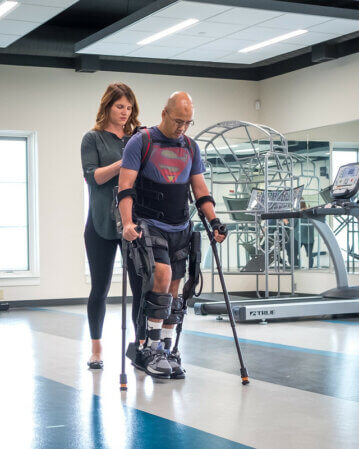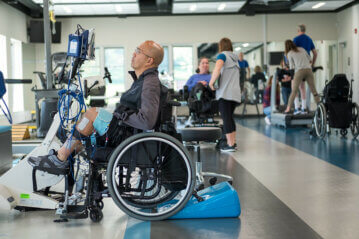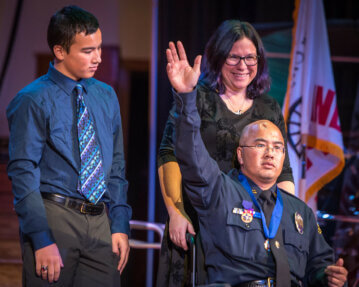How do you prepare for the day you lose everything?
How do you react to it, reckon with it?
How do you ever begin to rebuild?
For Tom Wagstaff—a loyal husband, devoted father of two, and respected member of the Independence, Missouri Police Department— everything changed on March 29th, 2017, the day Tom suffered a gunshot wound to the head during a response to a home burglary.
The damage to Tom’s brain had been catastrophic, and he was placed into a medically induced coma. In the unlikely event that he survived, it was impossible to predict how much of Tom—both physically and cognitively—would remain.
When Tom awoke, he couldn’t walk. He possessed barely the core strength and balance to sit upright in a hospital bed or even the powered wheelchair he’d occupy for the first months following his injury. He struggled to move his limbs. He ate slowly, his voice sounded breathless and he required multiple aides to complete menial, everyday tasks.
He had survived against all odds. But survival meant being stripped of a lifetime of skills.
“People always ask what it is like to have a brain injury,” Tom said. “I went from being an adult to an infant again in a matter of a second.”
When Tom came to QLI in June, he had regained specific faculties to a degree. Motor ability began to return to his control. His cognition began to clear
QLI endeavored to complete the puzzle.
“Initially, my goal was to get back to work,” Tom said, “but as time progressed and I progressed through my rehabilitation process, that became less and less important to me. More important was just getting back home and being a family man again. Being a father to my children and husband to my wife.”
That life path became the lens through which QLI’s clinical team viewed every element of Tom’s recovery. How would Tom return to his life? How could he be successful in granular tasks, like taking the garbage out or cooking independently? How would Tom take part in the community he had loved and protected for so long? How would Tom continue to be a positive influence for his sons, whether enjoying their favorite pastimes together or simply being present in their lives?
His therapists not only proposed these questions but engineered a battleplan, a comprehensive therapy strategy, to provide concrete answers. QLI combined cutting-edge rehabilitation technology and physical therapy to maximize Tom’s strength and endurance. After months of being off his feet, Tom walked with regularity and purpose. QLI’s cognitive therapy optimized Tom’s communication and problem-solving abilities, making him flexible and capable in novel situations. By the end of his stay in QLI’s program, Tom was not only communicating easily and effectively, but executing critical real-world tasks. Managing his finances, for instance. Even building the early stages of a class he planned to teach at the police academy.
Soon, independence wasn’t a goal. For Tom, it was a reality.

Truly, he had sacrificed. Truly, he was a hero. But despite a bullet in the head and the gravest of prognoses, he had endured, too. A traumatic brain injury derailed Tom’s life without regard for his control or his consent. But surrounded by a team relentless in its commitment to spark his constant growth, he continues to live with purpose and hope.
Tom’s story isn’t a story the things lost in a brain injury. It’s about the things reclaimed.
Categories: Adaptive Technology, Brain Injury, Neuroplasticity, QLI Magazine, Skill Acquisition

